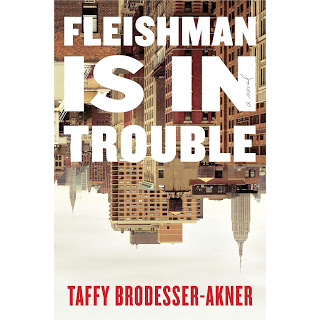This novel, a NEW YORK TIMES bestseller, appeared on so many of various news and social media feed that I sort of put off reading it. No one likes the hard sell. Or the feeling that the algorithms have profiled your preferences so exactly to find you content you will like. But eventually I broke down and bought it. And alright robot overlords I admit it! It is content that I like.
The novel tells the story of Toby Fleishman, who is getting divorced. He has joint custody and a lot of anger issues. He is just discovering the world of dating apps. Then his ex-wife disappears and his life takes a downward (or is it upward?) turn. Primarily what I liked was the sharply comic turn of phrase. How’s this:
Toby had been told all his life that being in love means never having to say you’re sorry. But no, it was actually being divorced that meant never having to say you’re sorry
Or this:
People under forty had optimism. They had optimism for the future; they didn’t accept that their future was going to resemble their present with alarming specificity.
Or this, about a hospital
Being at the hospital was like being inside the future, but as it was imagined by science fiction films in the last part of the twentieth century, not the actual future we ended up with, where everything just turned out being smaller and flimsier than it used to be
Or here, an offhand description of some man:
It was unclear if he knew about his blackhead situation
This is more than enough to keep the novel enjoyable. The actual story, and its larger themes, were maybe not quite so successful. Basically, the novel is interested in exploring the idea of midlife and marriage, and especially what happens when one partner stays at home. Apparently, we all get very unhappy and most of us are having affairs. This I didn’t quite follow. First of all, it’s not my experience. I know lots of happy married people. Second, all the characters wealthy. The central character is a doctor on $200K annually, which is apparently not enough for that social set, and he is rather a figure of pity, though as he tells us – “ .. . he’d gone into his field at a time when doctors could still be respected” – ie., before the rise and rise of the banker and the consultant.
Perhaps money really can’t buy happiness, but can buy unhappiness? This is also not my experience. I have no data set to advise on this one. But the book is very much about women, and there I do have some experience. The thrust of the book is very much that
The world diminished a woman from the moment she stopped being sexually available to it, and there was nothing to do but accept that and grow older
And apparently this is like a truth we all have to live with. I mean I really don’t get it. The older I get, the more trouble I seem able to cause. So I realy don’t understand all the suffering. But I get that for certain women with a lot of money, who want a lot more money, and don’t have jobs, the struggle is real. It’s hard not to sound dismissive. But you know, get a job. Then you won’t have time to worry about if you are sexy enough.

